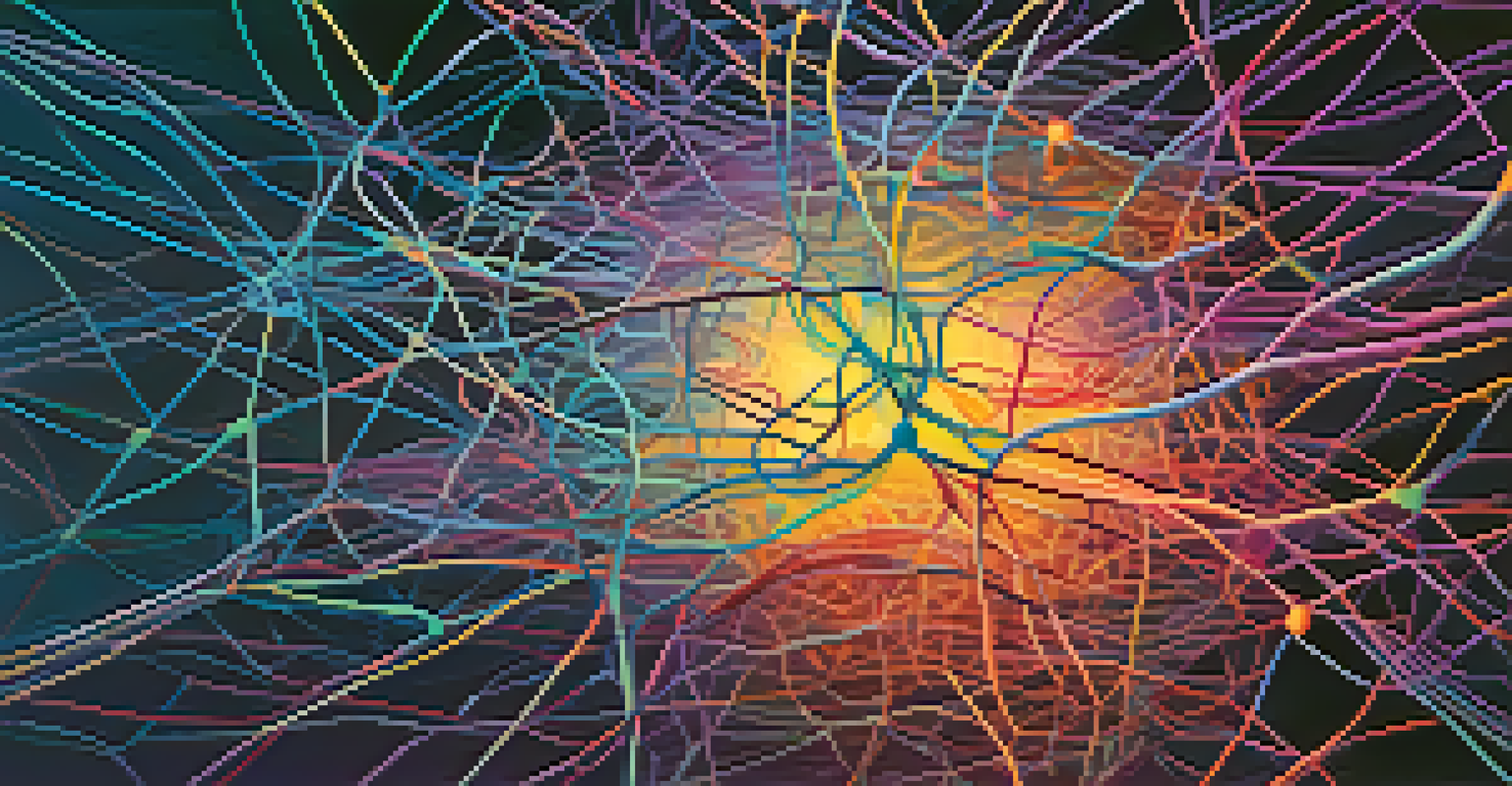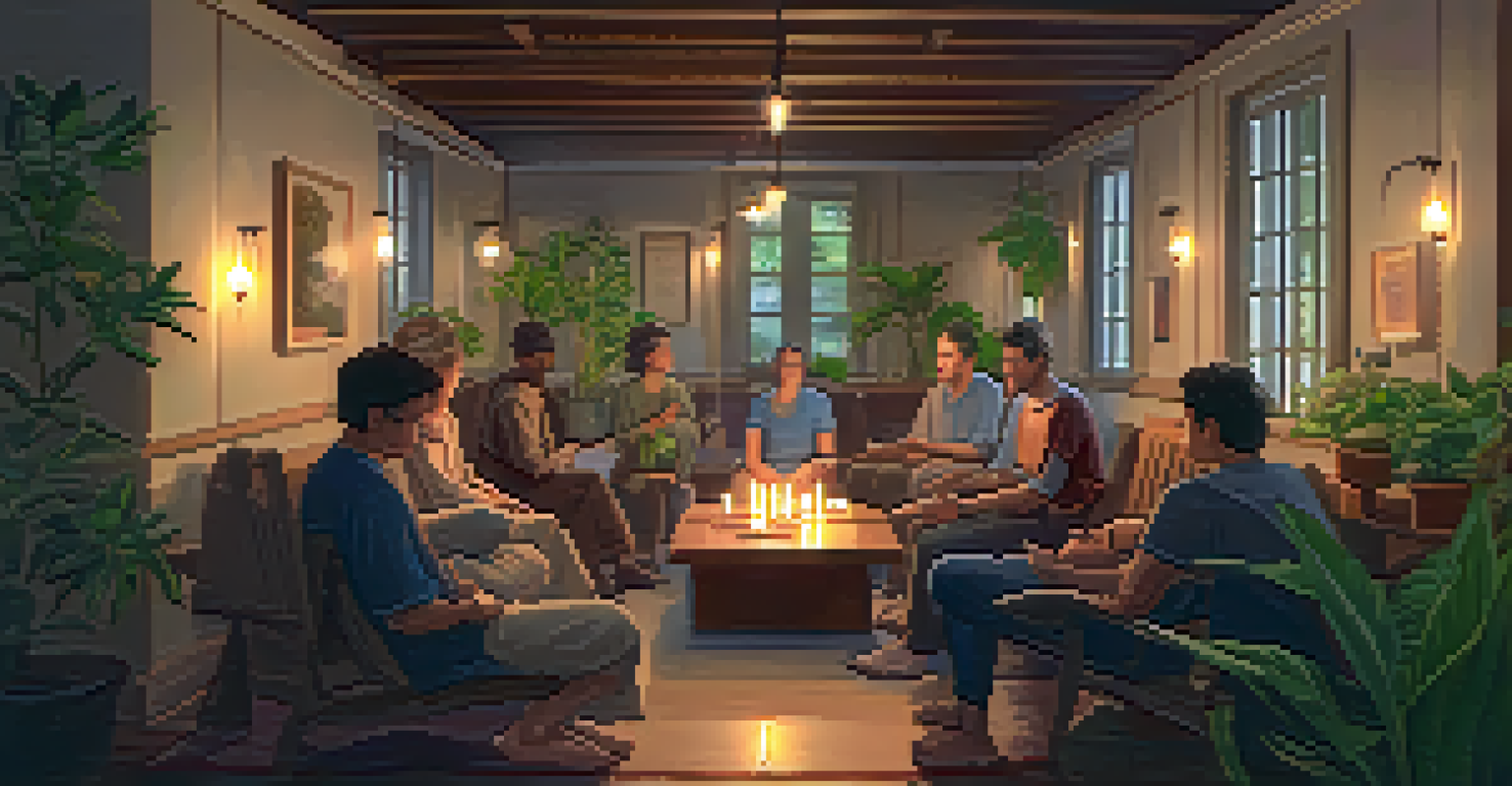Building Empathy Through Shared Hallucinogenic Experiences

Understanding Hallucinogenic Experiences
Hallucinogenic experiences refer to altered states of consciousness triggered by substances like LSD or psilocybin. These experiences can lead to profound changes in perception, mood, and cognition. While often associated with personal introspection, they can also create unique opportunities for connection with others.
The greatest gift of human beings is that we have the power of empathy.
When individuals partake in these experiences together, they often share insights and emotions that can deepen their understanding of one another. It's akin to embarking on a journey where everyone is navigating through a shared landscape of thoughts and feelings. This can break down barriers and foster a sense of unity.
Furthermore, the very nature of hallucinogens often encourages vulnerability, making participants more open to discussing their feelings and experiences. This openness can enhance empathy, allowing individuals to step into each other's shoes in ways they might not have otherwise considered.
The Science Behind Shared Experiences
Research has shown that shared experiences can strengthen social bonds and increase empathy. When people experience something together, whether it’s joy, fear, or even confusion, they create lasting memories that can enhance their emotional connection. This phenomenon is particularly potent in the context of hallucinogenic experiences.

Neuroscientific studies suggest that hallucinogens can alter brain connectivity, allowing for increased emotional communication between individuals. For instance, the default mode network, which is involved in self-referential thought, can become more integrated with other brain regions, enhancing interpersonal empathy.
Empathy Through Shared Experiences
Hallucinogenic experiences can enhance empathy and emotional connections among participants, fostering deeper understanding.
Moreover, the release of neurotransmitters like serotonin during these experiences may amplify feelings of connection and understanding. This biological basis reinforces the idea that sharing hallucinogenic experiences can indeed foster deeper empathy among participants.
Creating Safe Spaces for Exploration
For shared hallucinogenic experiences to be beneficial, it’s crucial to create a safe and supportive environment. Participants should feel comfortable expressing their emotions and thoughts without fear of judgment. Establishing ground rules and ensuring everyone is on the same page can help facilitate this atmosphere.
Empathy is about finding echoes of another person in yourself.
Additionally, having a trained guide or facilitator can enhance the experience. This person can help navigate challenging emotions or insights that may arise, ensuring that everyone feels supported throughout the journey. It’s like having a trusted friend by your side during a deep dive into the unknown.
Safety protocols, such as understanding dosage and potential interactions, are also vital. By prioritizing safety, participants can focus on the shared experience and the empathy it fosters, rather than worrying about external factors.
Empathy as a Tool for Personal Growth
Building empathy through shared hallucinogenic experiences can significantly contribute to personal growth. Participants often leave the experience with a renewed sense of self-awareness and an understanding of others. This can lead to changes in behavior and attitudes that reflect a more compassionate worldview.
For instance, someone who has never understood the struggles of mental health might find a new perspective after sharing a hallucinogenic experience with a friend who has faced these challenges. This newfound empathy can motivate individuals to advocate for others and foster supportive communities.
Creating Safe Exploration Spaces
Establishing a safe and supportive environment is crucial for participants to fully express their emotions during shared hallucinogenic experiences.
Personal growth through empathy is not just beneficial for the individual; it can have ripple effects in their social circles. As one person grows in understanding, they can influence those around them, creating a broader culture of empathy and support.
Challenges and Ethical Considerations
While the benefits of shared hallucinogenic experiences are notable, there are challenges and ethical considerations to address. Not everyone may be ready for such an intense emotional journey, and forcing participation can lead to discomfort or trauma. It’s vital to ensure that all participants are genuinely interested and prepared for the experience.
Moreover, the legality and safety of hallucinogens vary widely across regions. Educating participants about local laws and potential health risks is essential. Navigating these challenges responsibly is key to ensuring that the focus remains on empathy and connection.
Additionally, the potential for exploitation exists in any therapeutic setting, including those involving hallucinogens. It's crucial to approach these experiences with integrity and mindfulness, ensuring that the primary goal is to foster empathy rather than personal gain.
Real-Life Stories of Transformation
Many individuals have shared transformative stories about their hallucinogenic experiences that emphasize the power of empathy. For example, a group of friends who experienced a guided psilocybin session reported profound changes in their relationships, citing a newfound understanding and appreciation for one another.
These real-life anecdotes illustrate how empathy can blossom in unexpected ways. Individuals often recount moments of clarity during their experiences when they realized the struggles and joys of their companions, reshaping their perspectives long after the experience ended.
Challenges and Ethical Considerations
Addressing readiness, legality, and potential exploitation is essential to ensure that shared hallucinogenic experiences remain focused on fostering empathy.
Such stories serve as powerful reminders of the potential for shared hallucinogenic experiences to foster growth and connection. They highlight that while the journey may be personal, the insights gained can resonate within a community, promoting a culture of empathy.
The Future of Empathy and Hallucinogens
As society grows more open to discussing mental health and emotional well-being, the potential for hallucinogens as tools for empathy is gaining traction. Researchers are exploring how these substances can be integrated into therapeutic practices to foster deeper connections among individuals.
Future studies may focus on the long-term effects of shared hallucinogenic experiences on empathy and social cohesion. By understanding these dynamics better, we can harness the power of empathy in innovative ways, leading to healthier relationships and communities.

Ultimately, the future holds promise for using shared hallucinogenic experiences as a means to cultivate empathy. As we continue to explore these avenues, it’s essential to do so with care, respect, and a commitment to fostering genuine understanding among individuals.